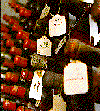|
The easiest and probably also best solution is quite simple.
Use the quadrant-system, similar to a chess-board with A;B;C.... and 1,2,3 etc.
Whether you write it down on a piece of paper / cellarbook or
if you input the data on a computer is a matter of taste and
preferences,- just like the wine itself.
What you should observe from the very beginning is as follows:
1. It is a definite advantage to have each and every bottle
placed at its own "address" separate from any other bottle,
as otherwise you will be "disturbing the piece", of other
bottles, upon removal/examination of the bottle in question.
2. It goes without saying, that the above guideline also should
be performed, even if you had 36 bottles from the same
producer (and same year), stored on one specific shelf in a
rack. Unfortunately a great number of known connaisseurs
and authors on wine have mislead collectors of fine wines,
that the bottles did not have to be separated from each
other if identical in terms of producer and vintage.
Well they were wrong. There is not two wines that are
identical,- at least not after a very short period compared to
the lifespan of the wine itself.
The reason is obvious. Imagine a couple of cases of wine
from the same producer,- well even just one case or less.
Do you know if the wine in question has been bottled
entirely from the same cask into the bottles you have ?
Do you know if the bottling took place in the beginning
or end of emptying the cask ?
Is the quality of the cork identical on all bottles in question ?
Do the bottles contain the same amount of wine or is there a
difference from bottom of cork to top of wine, compared
bottle to bottle ?
3. It can be discussed back and forth, whether you should
leave a case untouched, but there is a reason why one of
the two leading auction-houses always open the cases.
4. Finally, you should store your white-wines on the lower-
level of your rack, due to their shorter lifespan (there are
exceptions from this) and also the drinking-temperature
of the white-wine, which is almost similar to the cellar-
temperature on the lower-level.
Also look under A good advice on wines
|
|
